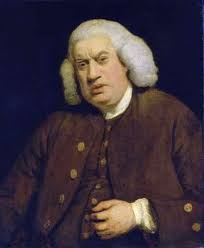SAMUEL JOHNSON
Samuel Johnson (1709-1784) was a prominent English poet and critic, biographer, lexicographer and essayist, who is referred to by some as ‘arguably the most distinguished man of letters in English history’. His life has been described in James Boswell’s monumental Life of Samuel Johnson. Johnson was born in Lichfield, Staffordshire, and was educated at Pembroke College in Oxford, although he was forced to leave school prematurely because of financial strains. He vainly sought a position in teaching, but was unsuccessful mainly because of his suffering from a disease (possibly Gilles de la Tourette) After some time he moved to London where he started his literary career, writing for The gentleman’s magazine. One of his great achievements was A dictionary of the English language, which was published in 1755 and remained the main reference work for some 150 years, when the Oxford English dictionary appeared. He also edited an annotated collection of The plays of William Shakespeare which occupied him for many years. In the meantime he wrote essays, poems, pamphlets and contributions to journals and the important Lives of the poets (1781). In 1759 Johnson wrote his only novella, Rasselas, a philosophical tale inspired by the vogue of orientalism.
The fragments:
The short novel Rasselas is categorized by Pike Conant as a philosophical Oriental tale. The story is about Prince Rasselas who is confined in the Happy Valley in Abyssinia, but fails to find happiness there. Together with his sister and two friends he escapes to find happiness in the world, but after some time he returns to Abyssinia in disappointment. The story can be compared to Voltaire’s Candide, although it is not as satirical. It rather reflects Johnson’s more morose outlook of life. The novel is one of the best examples of a procedure which was popular at the time: the examination of philosophical issues in a ‘neutral’ exotic zone, inspired by the vogue of the Oriental tale and the Thousand and one nights. Some chapters clearly evoke the atmosphere and ambience of the Nights, with its magical, romantic and mysterious connotations. The concept of Rasselas was a source of inspiration for other authors, such as Hawkesworth and Sheridan.

Sources/references:
James Boswell, The life of Samuel Johnson, ed. Christopher Hibbert, Penguin Classics, New York 1986.
Peter Martin, Samuel Johnson: a biography, Belknap Press, Cambridge, Massachusetts, 2008.
Pike Conant, The Oriental tale in England in the eighteenth century, Octagon Books, New York 1966.
Weblinks:
http://www.gutenberg.org/author/Johnson,+Samuel+(1709-1784) (Project Gutenberg)
https://archive.org/ (Internet Archive)
http://librivox.org/author/867(Libri Vox Audiobooks)